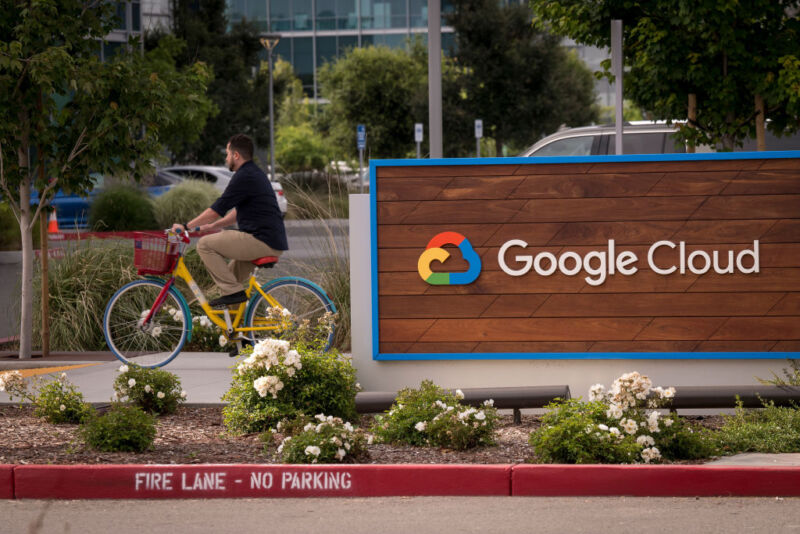Google's offices were once famous to outsiders as a whimsical, magical place full of giant playground slides, 24/7 staff masseuses, a huge selection of free food, and complimentary laundry service. Today, in the new, cost-cutting era of Google, some employees don't even get to have their own desks.
CNBC's Jennifer Elias obtained an internal document from Google's "Cloud" division, which declares, “Most Googlers will now share a desk with one other Googler.” The move is apparently part of a cost-cutting measure that will allow Google to “continue to invest in Cloud’s growth,” and will result in some buildings being vacated. CNBC says the new policy will apply to Google Cloud's biggest US locations, in Kirkland, Washington; New York City; San Francisco; Seattle; and Sunnyvale, California.
Rather than the humorous image of Google employees sitting shoulder-to-shoulder and fighting over desk space, employees are expected to alternate their desk usage from one day to the next. After the pandemic and the work-from-home trend, Google wants employees to visit the office twice a week on a "hybrid work" policy. So they'll be expected to partner with a desk buddy and set the rules for how they will share. Google's document says if you don't stick to your schedule you could end up without a desk; in that case, you'll have to work at an “overflow drop-in space.”
Team leads are expected to "set norms with their teams around sharing desks, ensuring that pairings of Googlers have conversations about how they will or will not decorate the space, store personal items, and tidiness expectations." Google also increased limits on the use of conference rooms.
Exactly how desk sharing is going to work with important desk items, like a computer, is probably going to take some getting used to. One bizarre line of the CNBC report reads, "[Google's] FAQ said that employees with computer workstations will no longer have those workstations located directly under their desks, but instead will have to look up its location in a database or put in a ticket for troubleshooting." Google wants to move away from dedicated workstations and has an internal-only virtual desktop tool for thin clients called "CloudTop" that it would like employees to transition to.
The report says that internally at Google, employees criticized the company for smothering the announcement in "corpspeak." Google called the desk-sharing plan "Cloud Office Evolution” saying it would combine “the best of pre-pandemic collaboration with the flexibility" and would "ultimately lead to more efficient use of our space.” Teams are being organized into "neighborhoods" of 200-300 employees, with a "vice president or director" of each neighborhood that will be responsible for making sure everyone shares the office resources fairly. The post on the company's internal "Memegen" forum said, "Not every cost-cutting measure needs to be word mangled into sounding good for employees. A simple ‘We are cutting office space to reduce costs’ would make leadership sound more believable."
Earlier this month a Google spokesperson told SFGate it was "ending leases for a number of unoccupied spaces, and will work to consolidate under-utilized spaces in the future." Google has been on a cost-cutting tear lately. Last month it fired 12,000 employees—the largest exodus from a company that was previously immune to Big Tech layoffs. In the past seven or so months, Google has killed Google Stadia, the Pixel Laptop division, Project Loon, and most recently, a robot division called Everyday Robots. It cut Area 120 in half, merged Waze into Google Maps, and in another round of layoffs, cut 15 percent of the staff of Alphabet health company Verily and nearly 20 percent of the Alphabet robotics company Intrinsic.
The Cloud division makes up a quarter of Google's full-time employees, so it's a big real estate user. The group, a distant third place in the cloud provider market behind Amazon and Microsoft, has never turned a profit and most recently lost $480 million last quarter. A 2019 report from The Information claimed that Google Cloud was facing a deadline to come in second place by 2023, or it would "risk losing funding." That was a while ago, but it's 2023 now; Google Cloud is still in third, and this being specifically targeted at Google Cloud and not all of Google sure sounds like a budget cut.



3175x175(CURRENT).thumb.jpg.b05acc060982b36f5891ba728e6d953c.jpg)
Recommended Comments
There are no comments to display.
Join the conversation
You can post now and register later. If you have an account, sign in now to post with your account.
Note: Your post will require moderator approval before it will be visible.